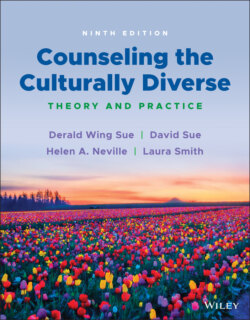Читать книгу Counseling the Culturally Diverse - Laura Smith L. - Страница 76
SELF‐DISCLOSURE, OPENNESS, AND INTIMACY
ОглавлениеMost forms of counseling and psychotherapy prioritize one's ability to self‐disclose and to speak fairly openly about the most intimate aspects of one's life. Indeed, the ability to self‐disclose has often been discussed as a primary characteristic of a healthy personality. Clients who do not self‐disclose readily in counseling and psychotherapy may be seen as possessing negative features (i.e., being guarded, mistrustful, or paranoid).
Disclosure and intimate revelations of personal or social problems are not acceptable to some cultural communities. For example, Asian Americans may consider such admissions to reflect not only on themselves as individuals but also upon their whole family (Chang, McDonald, & O'Hara, 2014). Thus, the family may exert pressure on an Asian American client not to reveal personal matters to strangers or outsiders. Similar conflicts have been reported for Latinx clients (Torres‐Rivera & Ratts, 2014), American Indians (Thomason, 2014), and Polynesian Americans (Allen, Kim, Smith, & Hafoka, 2016). Moreover, people from marginalized communities may be reluctant to disclose to White counselors because of their previous experience of racism (Ratts & Pedersen, 2014). A therapist who works with an individual from a cultural background like these may erroneously conclude that their non‐disclosing client is repressed, inhibited, shy, passive, or resistant. All these traits are often seen as undesirable by Western standards.
The structure of the therapy situation itself may further work against intimate revelations for some clients. Among many cultures, including American Indians and Latinx Americans, when intimate aspects of life are shared, it would not typically be beyond close friends. Relative to White middle‐class standards, these deep friendships are developed only after prolonged contact. Once friendships are formed, they tend to be lifelong in nature. In contrast, White Americans form social relationships relatively quickly, and the relationships may or may not persist over long periods of time. Counseling and therapy also seem to reflect these values. Clients socialized within a White European American context often understand that they are expected to talk about the intimate aspects of their lives with a relative stranger once every week for a 50‐minute session—they are aware that that's what therapy is. To many culturally diverse groups who stress longstanding friendship as a precondition to self‐disclosure, this aspect of the counseling process may seem utterly inappropriate and absurd.
